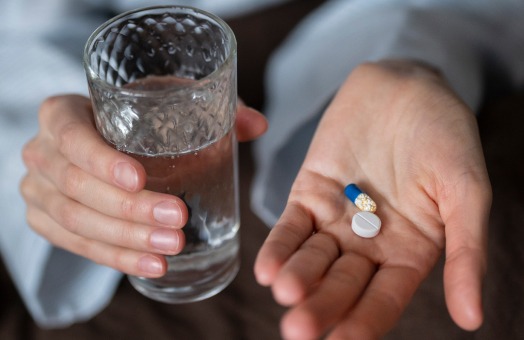If you’ve ever struggled with a mental illness and a substance use disorder, you aren’t alone.
In 2020, 17 million people, or 6.7% of the general adult population, experienced both a mental illness and a substance use disorder.[1] But there is hope. Dual diagnosis treatment is available to help you restore balance in life and pursue holistic recovery.
What is Dual Diagnosis Treatment?
When a person receives a dual diagnosis, they meet the criteria for a substance use disorder and one or more psychiatric disorders simultaneously.[2] Dual diagnosis may also be referred to as co-occurring disorder.
Dual diagnosis is a broad term with a wide range of potential severity. Mental health problems or substance abuse can be the causal factor. Someone suffering from mental health disorders may turn to drug use to self-medicate.
Unfortunately, doing so can exacerbate or intensify existing symptoms or activate new ones. Vice versa, substance abuse often lends itself to mental illness as it can significantly alter behavioral patterns, moods, and brain chemistry.[3]
Co-Occurring Disorders We Treat:
Dual Diagnosis Symptoms
What classifies someone as having a dual diagnosis is the presence of one or more mental health disorders in combination with a substance use disorder. The symptoms of each dual diagnosis will vary but carry some similarities. At our treatment center in Maryland, we treat both substance use disorder as well as co-occuring mental health conditions.
Common physical symptoms of substance abuse may look like the following:
- Noticeable or sudden weight loss
- Pupils with an abnormal size
- Bloodshot eyes
- Insomnia
- Coordination issues
- Slurred speech
- Shakiness
- Poor hygiene
The behavioral and psychological symptoms of dual diagnosis are:
- Withdrawn from family and friends
- Avoidance of daily responsibilities
- Engaging in risky behaviors
- Increased Agitation
- Abrupt changes in personality
- Unexplained fatigue and/or periods of excessive energy
- Restlessness
- Inability to focus
- Acting secretive
- Hanging out with a new group of people
- Financial issues
Dual Diagnosis Process
From the initial consultation to release, at Alpas Wellness, you can expect care from qualified clinicians who understand your diagnosis.
First, patients will speak with a knowledgeable admissions specialist to assess their condition and answer questions. From there, a diagnosis-specific treatment plan that may include individual therapy, group counseling, family therapy, and long-term recovery support services will be put together.
Types of Dual Diagnosis Treatment
One or more levels of interventions may be included in your individualized plan for recovery. Each patient’s condition and circumstances will be considered during admission.

Medical Detox

Because dual diagnosis often involves the use of drugs or alcohol, the first step is detoxification. While uncomfortable, it’s necessary before receiving mental health treatment. Rest assured, you’ll be supported by healthcare professionals 24/7 at our detox center in MD as you weather the withdrawal symptoms.

Residential Treatment

Patients needing intensive treatment may benefit most from an inpatient stay at our treatment facility. Here, they can focus on getting well without any distractions.

Medically Managed Care for Co-Occurring Conditions

Don’t let your concerns about other health conditions like diabetes or chronic pain keep you from seeking dual-diagnosis treatment. Our medical staff is here to help you manage all your co-occurring medical conditions.

Substance Use Disorder Treatment

Both your substance abuse concerns and the underlying psychological disorders that exist simultaneously must be addressed. It is only when approached from both sides that lasting recovery can happen.

Aftercare Program

Participation in an addiction aftercare program is important for sustained recovery success. Preventing relapse is easier with peer support
Types of Therapies Used For Dual Diagnosis Treatment
Those suffering from dual diagnosis are not only struggling with addiction but also mental health concerns such as depression, bipolar disorder, schizophrenia, or anxiety disorders. To ensure patients have the best chance for long-term sobriety, we offer a variety of therapies, including:
How (and Why) Dual Diagnosis Treatment Works
Research suggests that treating substance use disorder and mental illness as two separate diagnoses is ineffective and that integrated treatment programs that address both concurrently are more effective.[4] In a study evaluating the outcomes of integrative dual diagnosis treatment in patients with severe mental illness and substance use disorder, it was found that treating both together may result in reduced substance abuse.[5]
Dual diagnosis treatment works because it takes a holistic approach. Whether you need the constant monitoring of inpatient rehabilitation, the independence of outpatient care, or ongoing support groups to sustain your recovery, there are effective treatment options for everyone.
What’s the Best Way to Find Dual Diagnosis Treatment?
The easiest way to find a dual diagnosis treatment program is to consult your physician or therapist for a referral, use the treatment program database SAMHSA, or call a drug addiction helpline.
You can also call Alpas Wellness directly at (240) 571-3221, and someone from our caring and knowledgeable staff will guide you through the next steps.
Alpas Wellness Dual Diagnosis Treatment Center in Maryland
Our treatment center in Maryland specializes in treating both substance use disorder and co-occuring mental health conditions.
Get directions to our treatment facility and read our outstanding reviews
Cost of Dual Diagnosis Treatment
Treatment costs at Alpas Wellness will vary based on insurance coverage and the level of care needed. We accept most major insurance providers. Call our admissions team today to discuss payment options and verify insurance.
Frequently Asked Questions
Why Are Dual Diagnoses Difficult To Treat?
Many different combinations of disorders can come into play with a dual diagnosis, and symptoms can be difficult to disentangle.
Is A Dual Diagnosis A Coincidence?
Having a dual diagnosis is not a coincidence. According to the National Institute on Drug Abuse (NIDA), about half the people who experience substance use disorder have also struggled with a mental health disorder at one point in their lives, and vice versa.[6]
Can A Dual Diagnosis Treatment Center Help A Bipolar Disorder Patient?
Yes, it may be the best option for bipolar disorder patients if they also struggle with substance abuse.
Related Programs and Therapies
Additional Resources
SAMHSA. (October 2021). Key Substance Use and Mental Health Indicators in the United States: Results from the 2020 National Survey on Drug Use and Health. Retrieved from Key Substance Use and Mental Health Indicators in the United States: Results from the 2020 National Survey on Drug Use and Health (samhsa.gov) on 23 June 2023
NAMI. (March 2015). Dial Diagnosis. Retrieved from Dual-Diagnosis-FS.pdf (nami.org) on 23 June 2023
NAMI. (March 2015). Dial Diagnosis. Retrieved from Dual-Diagnosis-FS.pdf (nami.org) on 23 June 2023
Drake, R.E. and K. Mueser. (January 2000). Psychosocial Approaches to Dual Diagnosis. Retrieved from Psychosocial Approaches to Dual Diagnosis | Schizophrenia Bulletin | Oxford Academic (oup.com) on 23 June 2023
Kikkert, M., et al. (December 2018). Effectiveness of Integrated Dual Diagnosis Treatment (IDDT) in severe mental illness outpatients with a co-occurring substance use disorder. Retrieved from Effectiveness of Integrated Dual Diagnosis Treatment (IDDT) in severe mental illness outpatients with a co-occurring substance use disorder – ScienceDirect on 23 June 2023
NIH. (April 2020). Part 1: The Connection Between Substance Use Disorders and Mental Illness. Retrieved from Part 1: The Connection Between Substance Use Disorders and Mental Illness | National Institute on Drug Abuse (NIDA) (nih.gov) on 23 June 2023
